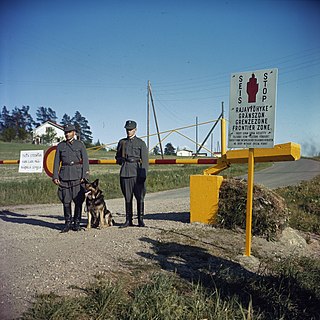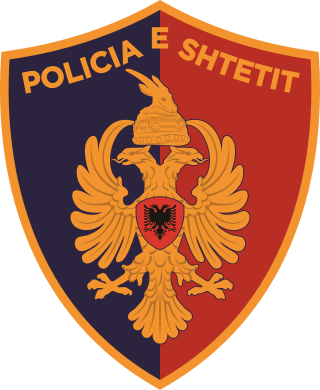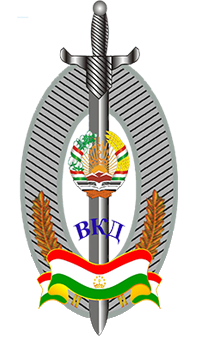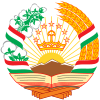
The Armed Forces of the Republic of Tajikistan, also known as the Tajik National Army is the national military of the Republic of Tajikistan. It consists of Ground Forces, Mobile Forces, and the Air Force, with closely affiliated forces including the national guard, border and internal troops.

The Armed Forces of the Republic of Uzbekistan, is the name of the unified armed forces of Uzbekistan, consisting of the Ground Force and the Air and Air Defence forces under the defence ministry. Paramilitary units include the National Guard, a Frontier Service and a River Force. It is reported to be the largest and the strongest in Central Asia.

The president of Tajikistan is the head of state of the Republic of Tajikistan. The president heads the executive branch of the country's government and is the commander-in-chief of the Armed Forces of Tajikistan.

Militsiya were the police forces in the Soviet Union until 1991, in several Eastern Bloc countries (1945–1992), and in the non-aligned SFR Yugoslavia (1945–1992). The term Militsiya continues to be used in common and sometimes official usage in some of the individual former Soviet republics such as Belarus, Tajikistan, Uzbekistan and Kyrgyzstan, as well as in the partially recognised or unrecognised republics of Abkhazia, South Ossetia, Transnistria, DNR and LNR. In Russian law enforcement, the term remained official usage until 2011.

OMON is a system of military special police units within the Armed Forces of Russia. It previously operated within the structures of the Soviet and Russian Ministries of Internal Affairs (MVD). Originating as the special forces unit of the Soviet Militsiya in 1988, it has played major roles in several armed conflicts during and following the 1991 dissolution of the Soviet Union.

A border guard of a country is a national security agency that ensures border security. Some of the national border guard agencies also perform coast guard and rescue service duties.

The Albanian State Police is the national police and law enforcement agency which operates throughout the Republic of Albania. The collapse of the Communist system and the establishment of political pluralism post-1991 brought important changes to the structure of the Albanian Police. The Ministry of Public Order and the General Directorate of Police were established in April 1991, and the new law of July 1991 established the Public Order Police. Nearly 80% of police manpower, i.e. personnel who had served under the previous system, were replaced by new recruits. On 4 November 1991, the Albanian Police was accepted as a member of Interpol.
Homiddin Hasanovich Sharifov was a Tajikistani lawyer and politician with the ruling People's Democratic Party of Tajikistan (PDPT). He served as the Minister of Internal Affairs of Tajikistan from 1996 to 2006.

The Police of the Republic of Armenia is the national police of Armenia.
The Serbian Police, formally the Police of the Republic of Serbia, is the national civilian police force of the Serbia. The Serbian Police are responsible for all local and national law enforcement. It is under the jurisdiction of the Ministry of Internal Affairs.

The National Guard, formerly called the Brigade of Special Mission and Presidential Guard, is the National Guard service branch of the Armed Forces of the Republic of Tajikistan, under direct command of the President of Tajikistan. Their primary task is ensuring public safety and security, which is similar to the tasks of the Tajik Internal Troops. The National Guard also takes part in ceremonial duties in Tajikistan.

The Ministry of Internal Affairs, also called the Ministry of the Interior, abbreviated VKD, is the interior ministry of the government of Tajikistan. It oversees the Presidential National Guard and the Internal Troops. Since 2012, the Minister of Internal Affairs has been Lieutenant General Ramazon Rahimov. He is responsible for youth crime prevention and working to lower youth crime rates in the country. The law "On Police" was adopted on 7 April 2004 by the Supreme Assembly of Tajikistan to define the duties of the interior ministry.

The Ministry of Defence of Tajikistan is the defence ministry of Tajikistan, overseeing the Tajik Ground Forces, Air Force, Mobile Forces. It also oversees purchases of equipment for the Tajik military. The other branches of the military, such as the Border and Internal Troops, are overseen by the Interior Ministry of Tajikistan. The Defence Ministry was founded in 1993 with Russian assistance.

The Tajik Internal Troops are the internal security force of Tajikistan, under the Interior Ministry (VKD). They act as the primary reserve force of the Tajik Armed Forces, and are in charge of homeland defence, along with the Tajik Border Troops. The Internal Troops are led by Major General Negmatullo Kurbanov.

The State Committee for National Security is the principal national security and intelligence agency of Tajikistan. Its main responsibilities include internal and border security, counter-intelligence, counter-terrorism, counter-narcotics, fighting organized crime, and surveillance. The chairman of the committee and all of his deputies are appointed by and answerable to the president of Tajikistan. Colonel General Saimumin Yatimov has served as the SCNS chairman since September 2, 2010.
Gulmurod Salimovich Khalimov was a Tajik and Islamist military commander. He was a lieutenant-colonel and commander of the police special forces of the Interior Ministry of Tajikistan until 2015, when he defected to the Islamic State. In September 2016, he was reported to have been appointed as the minister of war of IS in place of Abu Omar al-Shishani; his appointment had not been announced by IS for fears that he might be targeted in airstrikes by the anti-IS coalition. On 8 September 2017, Khalimov was allegedly killed during a Russian airstrike near Deir ez-Zor, Syria. However, the Tajik government, United Nations, and the United States believed that he was still alive by 2019, though his exact fate remained disputed. By 2020, Islamist militants claimed he had died at some point; this source was considered unreliable by the Tajik government. Regardless, the United States had removed Khalimov from their Rewards for Justice Program by 2021.

Armed Forces Day also known as Tajik National Army Day or Defender of the Fatherland Day is a national holiday celebrated annually on 23 February, commemorating the founding of the Armed Forces of the Republic of Tajikistan. The event is marked by military parades, fireworks and ceremonies around of the country.

The Military Institute of the Ministry of Defense of Tajikistan is higher military educational institution in the national education system of the Armed Forces of the Republic of Tajikistan. It was formerly named after Sangak Safarov, who served as the head of the Popular Front of Tajikistan.
The Academy of the Ministry of Internal Affairs of Tajikistan is a higher military institution in the Armed Forces of the Republic of Tajikistan which serves to train future soldiers and officers of the Internal Troops of the Ministry of Internal Affairs of Tajikistan. The academic year runs from September to July, with the tuition at the school is US$400–800 per student depending on their department.

The Militia of SFR Yugoslavia was a law enforcement agency of the Socialist Federal Republic of Yugoslavia from 1944 to 1992. The Militia was subordinated to the Federal Secretariat of Internal Affairs.


















